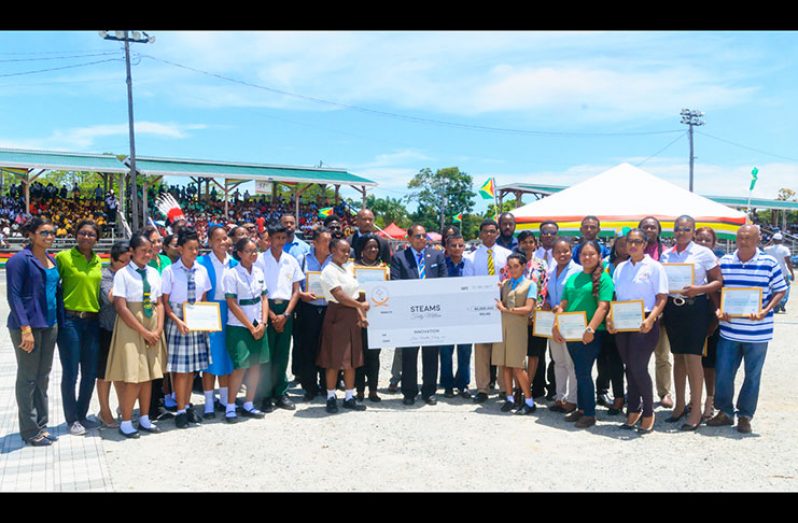–compliments of President’s Innovation Grant
SOME 25 youth organisations and Science Technology Engineering Architecture and Mathematics (STEAM) groups from across Guyana were on Friday presented with awards and grants totalling some $40 million, a gift from President David Granger.
The grants were handed over to representatives of youth organisations during the staging of Education Month activities at Durban Park, Georgetown.
Back in May, the Education Ministry had called for ideas and proposals through the Government of Guyana Innovation Programme, for innovative solutions to common problems or challenges within communities.
According to Education Minister Nicolette Henry, the responses were so overwhelming,that government had to reorganise the Youth Innovation Programme into the Innovation Programme of Guyana.
She said through the programmes, the ministry was flooded with solutions to the challenges faced in various communities, ranging from flooding, school dropouts and illiteracy to issues of mental health, gender discrimination and reproductive health.
“These solutions undoubtedly formed the frame of reference for non-formal education in Guyana. She said education sector reform will be enhanced when every Guyanese is engaged in capacity-building and is contributing to resolution of issues and is engaged at unprecedented levels of priorities.”
The proposals include a project from Hosororo Village, Region one (Barima-Waini), submitting alternative livelihoods for the youth, Innovative Method in Science, Architecture, Agriculture and Mathematics. The Kabakaburi Village Council in Region Two (Pomeroon/ Supenaam), joined with youth of the village to suggest a friendly space for the learning of the Arawak Language, a building of a museum and a skills-training facility. Over in Region Three (Essequibo Islands/ West Demerara) the Building Bridges Foundation suggested innovative ways in sewing and janitorial services for women and youth empowerment, to procure a training centre for sewing and janitorial activities. The region also produced in La Parfaite Harmonie, a neighbourhood beautification project.
The Ministry of Education received some 16 proposals from youth groups in Region Four (Demerara/ Mahaica) including from the African Cultural and Development Association (ACDA), which suggested a greenhouse for food security.
The organisation has also proposed a youth aviation camp, teaching the youth to fly in a vast safe and competitive airline environment.
Green Guyhoc has collaborated with its community to achieve cohesiveness and sustainable growth through agriculture, engineering and architecture.
The Non Pariel Airstrip Greenhouse club proposed the use of non-biodegradable materials for construction. From St Cuthbert’s Village, was a proposal for the Benab project; a central meeting place for the community, a learning space for the youth and a hammock space for guests.
The Youth Ministry of the Guyana Conference of Seventh-day Adventists made a proposal for a Youth Empowerment Project to be situated in Bartica, Region Seven (Cuyuni/ Mazaruni). That project will provide vocational skills, social enrichment, mentoring and education.
The SWAP Mobile App, a project which touts “learn, earn, connect and save” encourages the bartering of goods and services.
Another project called “Technology for Special needs” also found favour with the Ministry of Education. That project will see children who are physically challenged using technology to increase their capabilities, including powering hydroponic systems, a vertical aeroponics food production system, designed to grow plants with only water and nutrients rather than soil, upcycling from “trash to treasure” using discarded materials to create products of higher quality and value, participating in the green economy.
Fourteen secondary schools were collectively awarded the STEAM grant.
However, Queen’s College teamed with the University of Guyana to propose a project called “the true potential of coconut”, for the saponification of coconut oil and wood ash to provide Guyanese with affordable cleansing products.
Skeldon Line path Secondary School proposed to reduce the mosquito population and frequency of bites using Tulsi and Marigold plants. The Youth Agriculture Initiative from Bartica proposed Gainfully Active While Learning About Agriculture (GALA). Also, a small-business proposal from Paramakatoi is seeking to expand services in the remote region where the topography is a challenge. They plan to expand their services to neighbouring communities.




.png)









